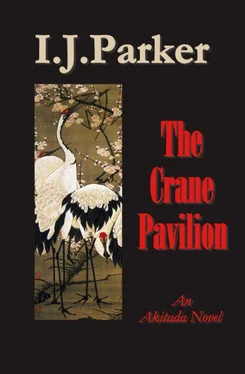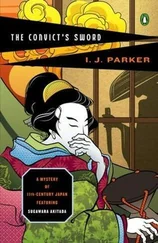I. Parker - The Crane Pavillion
Здесь есть возможность читать онлайн «I. Parker - The Crane Pavillion» весь текст электронной книги совершенно бесплатно (целиком полную версию без сокращений). В некоторых случаях можно слушать аудио, скачать через торрент в формате fb2 и присутствует краткое содержание. Жанр: Исторический детектив, на английском языке. Описание произведения, (предисловие) а так же отзывы посетителей доступны на портале библиотеки ЛибКат.
- Название:The Crane Pavillion
- Автор:
- Жанр:
- Год:неизвестен
- ISBN:нет данных
- Рейтинг книги:5 / 5. Голосов: 1
-
Избранное:Добавить в избранное
- Отзывы:
-
Ваша оценка:
- 100
- 1
- 2
- 3
- 4
- 5
The Crane Pavillion: краткое содержание, описание и аннотация
Предлагаем к чтению аннотацию, описание, краткое содержание или предисловие (зависит от того, что написал сам автор книги «The Crane Pavillion»). Если вы не нашли необходимую информацию о книге — напишите в комментариях, мы постараемся отыскать её.
The Crane Pavillion — читать онлайн бесплатно полную книгу (весь текст) целиком
Ниже представлен текст книги, разбитый по страницам. Система сохранения места последней прочитанной страницы, позволяет с удобством читать онлайн бесплатно книгу «The Crane Pavillion», без необходимости каждый раз заново искать на чём Вы остановились. Поставьте закладку, и сможете в любой момент перейти на страницу, на которой закончили чтение.
Интервал:
Закладка:
The road was well kept and smooth, no doubt to make travel by ox carriage more comfortable for ladies or pampered courtiers. It wound pleasantly through foothills covered with stands of pine and cryptomeria. Here and there, touches of brilliant red marked the season when maples suddenly burst into flame.
In the valley that the road followed as it wound its way into more mountainous regions, the rice had been harvested, leaving only yellow stubbles behind. Akitada was vaguely aware that it had been a good year. Much of what had happened in the world around him he had noted only as if through a mist or heard as indistinct noise from far away. He had built a cocoon about himself to keep life out while he dwelled inside with his thoughts of death.
Even now, he felt guilty for taking pleasure in the beauty of the day, the slow and elegant gliding of a hawk in the blue sky, the smooth movement of his favorite horse beneath him.
He reached the village of Iwakura before noon and got directions to Daiun-ji. The Great Cloud Temple was not precisely in the clouds; Mount Hiei loomed high above it. It was, however in a high valley of the foot hills and hidden from view. The location was quite beautiful and peaceful. Having been well-endowed by the Fujiwara family, it had become the favorite temple and monastery of imperial princes. A charming pagoda and many elegant halls nestled in the idyllic landscape.
Akitada handed over his horse to one of the monks, then announced himself to the gate keeper by name with the request to see abbot Genshin.
The gatekeeper, used to more impressive visitors, said, “His Reverence regretfully does not receive visitors. He is in seclusion.”
Akitada was irritated, but there was no point in taking his resentment out on this monk. He asked for paper and ink and wrote a short note: “I came to see the morning glories. Alas, I find them long gone, and only the sound of the waterfall is in my ears.”
The woman whose death had sent his former friend to take his vows had been called Asagao, the morning glory flower. It was perhaps unkind to remind the revered abbot of his past, but Akitada thought it would get him an interview. He was after all the only man who knew that shameful story.
He gave the monk the note, asking that it be delivered, and then strolled into the temple grounds. The main halls were quite large and beautifully made, with their green tile roofs curving elegantly above the white plaster, black beams, and brilliantly red railings. It looks like the great halls of the Daidairi, the imperial city in the capital below, he thought. He had no interest in seeing the inside of any of them but noted smaller buildings, some richly tiled, others with dark bark-covered roofs, tucked away here and there among the trees of the hillside. All of them were, no doubt, residences for monks of imperial blood or semi-retired royals. It was a peaceful and comfortable life here, far distant from the political and social struggles and stresses of the capital below. He wondered which of the buildings served as the abbot’s quarters, and thought that the former Tasuku had been greatly honored to have been named abbot of a monastery where so many of much higher rank had sought refuge.
These thoughts still preoccupied him when a slender young monk in a rather fine silk stole called out to him. The young monk looked at him curiously as he offered to take him to see Genshin.
“His Reverence normally does not see visitors during his meditations,” he told Akitada, hoping for an explanation.
“I was not aware of the abbot’s schedule,” Akitada said with a smile.
This cast the monk into a shocked silence.
The abbot’s quarters turned out to be only a short distance from the zendo , the meditation hall. Akitada’s guide pointed this out.
“I’m glad he didn’t have far to go in that case,” Akitada commented dryly.
Another silence ensued and lasted until they had climbed the wide steps with finely lacquered railings to a veranda where the monk called out, “Lord Sugawara, Reverence” and threw wide a pair of double doors.
Akitada walked into a spacious room, dimly lit through latticed windows. The floor was highly polished black wood, and a raised platform ran along the back wall. It was covered with thick tatami mats. In its center, stood the abbot’s chair, and in it sat Tasuku, dressed in dark gray silk with a rich, multi-colored stole draped across his left shoulder.
For a moment, Akitada thought he was expected to kneel on the floor below and bow to this man. He stopped abruptly and scowled.
Abbot Genshin smiled and rose smoothly. Stepping down from the raised dais, he came toward Akitada with outstretched hands.
“My dear Akitada,” he said in the familiar warm voice. “I had almost given up hope. But what a joyous day it is! You look well, but thinner than I recall. Come sit with me in the garden-viewing room.” He gestured toward a door.
They walked into the next, much smaller room which contained little beyond the thick tatami mats on the floor and a cushion or two. But here the screened doors had been opened wide to a narrow veranda and beyond it, to the most beautiful small garden Akitada had ever seen. Perfectly clean white gravel separated the building from lush mossy ground where ferns and small, clipped azalea bushes gave way to pine, willow, eucalyptus, and maple. There were no flowers, but the willow had turned a brilliant yellow, and the maple a deep red. Willow leaves spread like gold across the dark green moss and a small stone lantern. It was exquisite.
But this beautiful view did nothing for Akitada’s mood. He did not want to be here. He sat down and looked resentfully at the abbot.
Genshin was both heavier and older, and this did not suit him. It gave Akitada some satisfaction to see that the years had not left the handsome Tasuku unscathed. Only the large, soulful eyes remained. No doubt they were still useful in turning people’s heads.
Before Akitada could say anything, a small boy, beautifully dressed in a red brocade robe and white silk trousers, came in with a tray which he placed between them.
Genshin smiled at him. “Thank you, Sadayoshi. That was very neatly done.”
The boy grinned, revealing a missing front tooth, and bowed before scampering out.
“A novice,” Genshin explained. “One of the sons of the chancellor. He is a good boy.”
Perhaps it was meant to impress or even intimidate him. Akitada did not know what to say to it. He would not wish a monastic life on his own son, even if there were compensations of comfortable living. But many of the highest ranking nobles dedicated younger sons and daughters to the religious life, hoping thereby to gain entrance to paradise after their own deaths. He covered the awkward silence by taking a drink from the lacquered cup. The fruit juice was delicious, with a taste of oranges and wild berries.
Genshin was studying him. “I heard something about you from time to time,” he said. “You are still in the Ministry of Justice, I think?”
Akitada was not, but he nodded rather than giving explanations.
“And your efforts at finding out evil and arresting evil-doers have, I think, brought you considerable distinction over the years,” Genshin went on. It was said teasingly, implying that such activities were trivial amusements.
Akitada did not take the bait, if that was what it had been. It must be an uncomfortable subject for the abbot, who had been involved in one of Akitada’s earliest investigations and had trusted him to keep a secret that would most certainly disqualify him from his present position.
“I’m still engaged in the same line of work,” he said stiffly.
Genshin smiled. “Ah, you came with an ulterior motive then. No, no, don’t apologize. I’m very grateful that your work has finally brought you to me, Akitada. I have often thought of you, and always with great fondness.”
Читать дальшеИнтервал:
Закладка:
Похожие книги на «The Crane Pavillion»
Представляем Вашему вниманию похожие книги на «The Crane Pavillion» списком для выбора. Мы отобрали схожую по названию и смыслу литературу в надежде предоставить читателям больше вариантов отыскать новые, интересные, ещё непрочитанные произведения.
Обсуждение, отзывы о книге «The Crane Pavillion» и просто собственные мнения читателей. Оставьте ваши комментарии, напишите, что Вы думаете о произведении, его смысле или главных героях. Укажите что конкретно понравилось, а что нет, и почему Вы так считаете.












